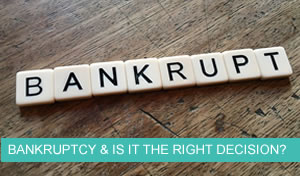What is Bankruptcy?
 Bankruptcy is a form of insolvency and legal status for people who are unable to repay the money that they owe. You will need to have unsecured debts of over £5,000 for a creditor to force you into bankruptcy. There is no limit if you declare yourself bankrupt. Once you’re declared bankrupt you won’t have to deal with your creditors, nor can they take further court action against you, or bombard you with letters or phone calls. These will be directed through a Trustee, whether it be the Official Receiver or an Insolvency Practitioner.
Bankruptcy is a form of insolvency and legal status for people who are unable to repay the money that they owe. You will need to have unsecured debts of over £5,000 for a creditor to force you into bankruptcy. There is no limit if you declare yourself bankrupt. Once you’re declared bankrupt you won’t have to deal with your creditors, nor can they take further court action against you, or bombard you with letters or phone calls. These will be directed through a Trustee, whether it be the Official Receiver or an Insolvency Practitioner.
Bankruptcy will usually last a year. Your existing debts will then be written off after the year, and you will then be able to start over financially, albeit with the constraints of Bankruptcy on your credit file.
Call us Now – Our Partner Can Fight Your Corner – 0800 368 9596
How can Bankruptcy happen?
You can declare bankruptcy yourself involuntarily in England or Wales by applying online through the Government’s website. Alternatively, an aggressive creditor who you owe money to may declare you bankrupt. They might do this in an attempt to get some of the money back that you owe them. High Street lenders will tend to work with you to find another option to pay off your debts.
You can declare yourself bankrupt in Wales and England if you live outside the EU or in Denmark. You can’t declare yourself bankrupt if you lived somewhere else in the EU, other than England and Wales. Read here for more information on Scottish Debt Solutions for Scotland.
An Insolvency Practitioner might also make you bankrupt if you haven’t adhered to the terms of an IVA.
Although Bankruptcy does have benefits and is the most appropriate course of action for some people, it is considered by some as a last resort and a severe form of insolvency. There are still 1,000s of bankruptcies in the UK each year.
Are there any other alternatives to Bankruptcy? Bankruptcy vs IVA?
You may wish to consider other options first. For example, you may wish to consider an Individual Voluntary Arrangement (IVA), or a Debt Relief Order (DRO). Some people who are declared bankrupt may have gone through one of these options first.
If you have considered the above and can’t see a solution to paying your debts and it’s unlikely your situation will improve, and there is little equity in your home, or you have few possessions of any value, bankruptcy should be seriously considered.
Should I declare Bankruptcy?
If you are considering bankruptcy, you must get advice and weigh up all the advantages and disadvantages. You can speak to an independent and free debt advisor such as National Debtline or the Citizens Advice Bureau. Alternatively, you can seek formal and paid advice from a professional such as a solicitor, insolvency practitioner, financial advisor your accountant.
What Debts are included and excluded from Bankruptcy?
Included
- Most of your Secured Debt such as personal loans, credit and store card debt, payday loans and catalogue debt
- Gambling Debts, although there are some restrictions
- Parking Charge Notices
- Utility and Council Tax Arrears
Excluded
- Secured Debts, such as those secured against your house or car
- Guarantor loans or Joint Debt
- Child maintenance or Child Support payments
- Student Loans
- Personal Injury Claims
- Debts related to Fraud, including Income Support and Benefit and Tax Credit Overpayments
- Debts accrued immediately before Bankruptcy was obtained
- Court Fines
What is the Bankruptcy Process?
Apply for Bankruptcy
- You can apply for Bankruptcy online via the Government website, or you’ll receive a copy of the Petition if someone else has applied to make you bankrupt.
Get a decision
- The application usually takes 28 days to get a decision but can take slightly longer. The adjudicator will either reject the application or make a bankruptcy order. If the application is rejected you can appeal.
Co-operate with the Official Receiver / Trustee
- Once your application is approved you will have an interview with the Official Receiver. You will need to give them detailed information on your Statement of Affairs including assets, finances, income and living expenses. The more organised you are, the easier the process will be. If you don’t attend the interview or cooperate with the Official Receiver, your bankruptcy will extend beyond the 12 months.
All Bank Accounts will be immediately Frozen
- It may be an idea to open a new basic bank account, although some banks may not open any type of account to a bankrupt.
Payment of Creditors
- If you have assets they will be put in control of the Trustee (an Official Receiver or Insolvency Practitioner if they have been appointed). The Trustee will sell your assets and liaise with the Creditors, informing them how the money will be paid. There will be some fees to pay that will be deducted from the sale of any assets. Assets you can keep include everyday household items and items needed for work.
- If there are insufficient assets the Trustee will still process the bankruptcy.
- If you can afford it, the Trustee will request that you make regular payments off your debt through an income payment scheme. Payments normally last for three years
Your Bankruptcy is Discharged
- Your Bankruptcy will normally be discharged after 12 months. They will bring an end to all the restrictions and release you from most of the debts when the initial bankruptcy order was made. Your bankruptcy can be extended if you didn’t cooperate with the Trustee.
What is the role of the Official Receiver?
As soon as you apply for Bankruptcy and a Bankruptcy Order is made, all of your assets will come under the control of the Official Receiver. They will manage the bankruptcy process for you and interview you to discuss the bankruptcy. This usually happens within 10 working days of the order taking place. They are effectively in charge of the bankruptcy.
Their key roles are: –
- The administration of the Bankruptcy Process
- They will investigate the financial affairs of the bankrupt person and the conduct of them leading into the bankruptcy
- They will inform and liaise with all creditors
- Advertise the bankruptcy in the London Gazette
What is the cost of going bankrupt?
You will need to pay £680 to apply for bankruptcy (£130 adjudicator fee and a deposit of £550).
Other costs may include: –
- Professional fees for solicitors and the people engaged to administer the bankruptcy process (I.e. Trustee).
- Costs of selling your assets to pay off creditors
- General administrative costs of the bankruptcy process
How will declaring myself as Bankrupt affect me?
Ability to act as Director – You will not be allowed to act as Director or CEO of a company. If you manage a business, you will need to inform those people you do business with that you are bankrupt.
Impact on Spouse or others – If you’re financially associated with someone and you’re declared bankrupt, it could impact them negatively. Examples include a shared mortgage or a joint bank account.
Your Bankruptcy will be Public Knowledge – All bankruptcies will be registered on the Insolvency Register and different to IVAs, bankruptcies will also appear in The Gazette
Restrictions on Employment – You are unable to work in certain professions if you have been declared bankrupt, in particular, those that involve financial matters or law.
You may lose your home, valuables and possessions – Your assets will potentially be sold to pay off creditors. Basic household goods will be excluded.
Access to Credit – Bankruptcy will have a huge impact on your credit rating, meaning getting borrowing or credit will be difficult.
Repayment of Debts – If your income is at a certain level, you may be asked to make repayments for up to 3 years after the bankruptcy order has ended.
There are however some advantages …
Pressure / Stress – By being made bankrupt, it may relieve you of the stresses that have led to it. Creditors also have to cease taking court action and chasing you for repayment.
Repayment of Debt – You won’t necessarily have to repay all the debts. Furthermore, if you do have to make payments from income, this will only be for three years.
Exempt Goods – You are allowed to keep everyday household items and items you need to do and get to your job.
Disposable Income – You are allowed to keep a reasonable amount of income to live off.
How can I improve my Credit Rating after Bankruptcy?
As well as being public knowledge via The Gazette and the Insolvency Register, it will also impact your Credit Rating.
- Order a statutory credit report from one of the three main credit reference agencies (Experian, Equifax and TransUnion)
- You have the option to add a summary in your report giving a reason for going into debt (i.e. health issues, redundancy, etc). It may help by updating this
- Update all personal details on your credit profile
- Register for the electoral roll at your current address
- In the longer-term, you will need to prove to lenders and borrowers that you can manage your money responsibly. You can then build up your credit profile by using and repaying credit slowly and responsibly over some time.
Impact of Brexit on Bankruptcy
Until the Government formalises an exit agreement with the European Union (EU), there remain uncertainties of the impact of Brexit on bankruptcy. Any debts you owe in the EU might not be covered by bankruptcy as it stands now. If you live or work in the EU, any creditors could still potentially take you to court in the EU
If for example you live in the UK but own a home in the EU with a mortgage attached to it from an EU lender, they could still technically take you to court in the EU. It is important to get legal advice if you have creditors in the EU
Bankruptcy is an alternative insolvency solution to a Debt Relief Order (DRO) and a Individual Voluntary Arrangement (IVA).



